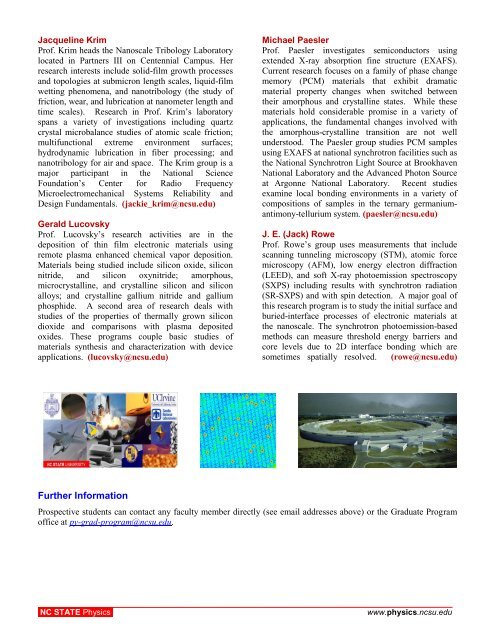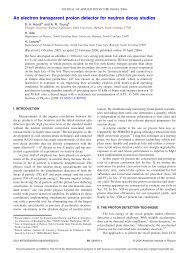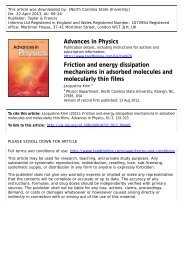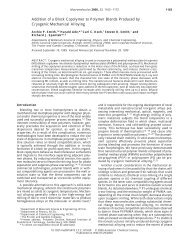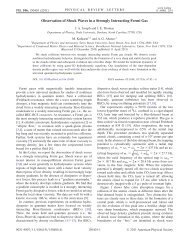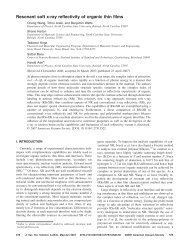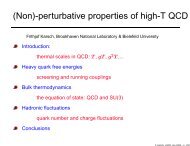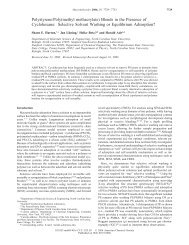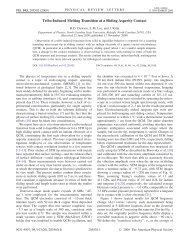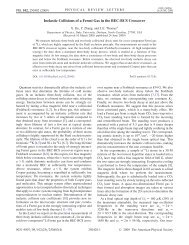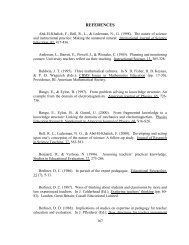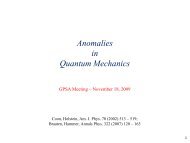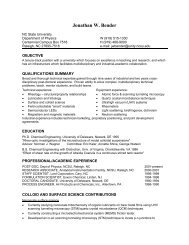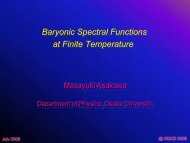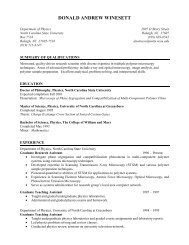Physics Graduate Brochure - Physics - North Carolina State University
Physics Graduate Brochure - Physics - North Carolina State University
Physics Graduate Brochure - Physics - North Carolina State University
Create successful ePaper yourself
Turn your PDF publications into a flip-book with our unique Google optimized e-Paper software.
Jacqueline Krim<br />
Prof. Krim heads the Nanoscale Tribology Laboratory<br />
located in Partners III on Centennial Campus. Her<br />
research interests include solid-film growth processes<br />
and topologies at submicron length scales, liquid-film<br />
wetting phenomena, and nanotribology (the study of<br />
friction, wear, and lubrication at nanometer length and<br />
time scales). Research in Prof. Krim’s laboratory<br />
spans a variety of investigations including quartz<br />
crystal microbalance studies of atomic scale friction;<br />
multifunctional extreme environment surfaces;<br />
hydrodynamic lubrication in fiber processing; and<br />
nanotribology for air and space. The Krim group is a<br />
major participant in the National Science<br />
Foundation’s Center for Radio Frequency<br />
Microelectromechanical Systems Reliability and<br />
Design Fundamentals. (jackie_krim@ncsu.edu)<br />
Gerald Lucovsky<br />
Prof. Lucovsky’s research activities are in the<br />
deposition of thin film electronic materials using<br />
remote plasma enhanced chemical vapor deposition.<br />
Materials being studied include silicon oxide, silicon<br />
nitride, and silicon oxynitride; amorphous,<br />
microcrystalline, and crystalline silicon and silicon<br />
alloys; and crystalline gallium nitride and gallium<br />
phosphide. A second area of research deals with<br />
studies of the properties of thermally grown silicon<br />
dioxide and comparisons with plasma deposited<br />
oxides. These programs couple basic studies of<br />
materials synthesis and characterization with device<br />
applications. (lucovsky@ncsu.edu)<br />
Michael Paesler<br />
Prof. Paesler investigates semiconductors using<br />
extended X-ray absorption fine structure (EXAFS).<br />
Current research focuses on a family of phase change<br />
memory (PCM) materials that exhibit dramatic<br />
material property changes when switched between<br />
their amorphous and crystalline states. While these<br />
materials hold considerable promise in a variety of<br />
applications, the fundamental changes involved with<br />
the amorphous-crystalline transition are not well<br />
understood. The Paesler group studies PCM samples<br />
using EXAFS at national synchrotron facilities such as<br />
the National Synchrotron Light Source at Brookhaven<br />
National Laboratory and the Advanced Photon Source<br />
at Argonne National Laboratory. Recent studies<br />
examine local bonding environments in a variety of<br />
compositions of samples in the ternary germaniumantimony-tellurium<br />
system. (paesler@ncsu.edu)<br />
J. E. (Jack) Rowe<br />
Prof. Rowe’s group uses measurements that include<br />
scanning tunneling microscopy (STM), atomic force<br />
microscopy (AFM), low energy electron diffraction<br />
(LEED), and soft X-ray photoemission spectroscopy<br />
(SXPS) including results with synchrotron radiation<br />
(SR-SXPS) and with spin detection. A major goal of<br />
this research program is to study the initial surface and<br />
buried-interface processes of electronic materials at<br />
the nanoscale. The synchrotron photoemission-based<br />
methods can measure threshold energy barriers and<br />
core levels due to 2D interface bonding which are<br />
sometimes spatially resolved. (rowe@ncsu.edu)<br />
Further Information<br />
Prospective students can contact any faculty member directly (see email addresses above) or the <strong>Graduate</strong> Program<br />
office at py-grad-program@ncsu.edu.<br />
.NC STATE <strong>Physics</strong>.<br />
www.physics.ncsu.edu


